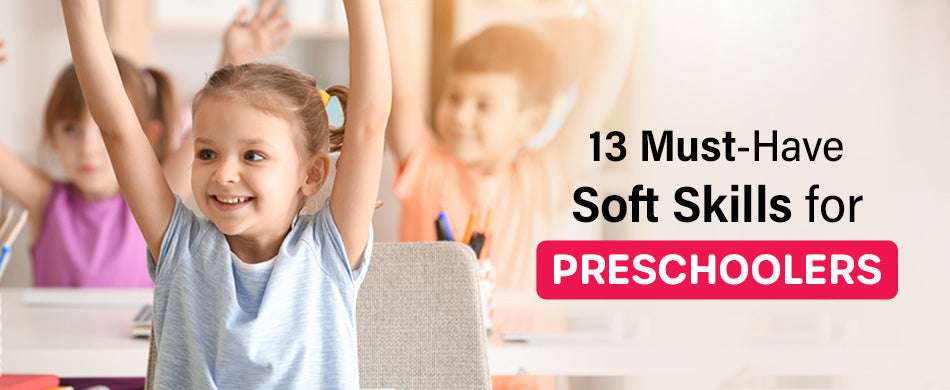13 Must-Have Soft Skills for Preschoolers
- by Babyorgano Developer

In our tech-heavy world, parents are worried about their kids' growth, especially in real-life skills. Technology has improved our lives and made us less connected to each other and ourselves. For instance, we are impatient, need things now, and cannot focus.
A Digital Rehabilitation Counsellor could be a future job, recognizing the problems of overusing technology. These professionals would help digital overconsumption victims escape technology and reclaim their lives. Social networking and other online platforms may be destructive and addictive. These variables may increase mental health costs by 2030, say scientists.
There is also concern that kids will do well in school but need more life skills. Good grades do not guarantee communication, money management, or relationship skills. People question their readiness to handle real-life issues like money and debt and confidently deal with others.
List of Essential Soft Skill Sets for Preschoolers
More parents realize that developing soft skills must be a focus immediately. Teaching our kids money management, communication, and social skills is as crucial as academic success if we want them to be happy and well-rounded. The focus is shifting from academic success to equipping youth with the skills to manage real-world issues.

Communication Skills
Communication skills prepare children for success in many areas. In addition to speaking, you should listen carefully and express your ideas and opinions.
Activities that encourage talking can help toddlers express their thoughts, feelings, and needs. Storytelling lessons spark imagination and develop logical stories.
Interactive talks and activities that involve attentive input can promote active listening, another crucial communication ability. We help kids listen by making them feel heard and respected.
Role-playing games also let kids practice communicating in diverse contexts, which improves their clarity and comprehension. Preschoolers learn to handle social situations and develop deep connections with kids and adults as they improve their communication skills.
Social Skills
Social skills are essential for kids to navigate the complex world of people. Preschoolers improve these skills through several activities.
Babies learn about social interaction by playing with other youngsters. Playdates are entertaining and teach youngsters to share, wait their turn, and resolve conflicts without fighting.
Work together on projects at school or home to learn how to work with others. Working on projects teaches children to speak, value other perspectives, and collaborate toward a goal.
These partnerships foster cooperation and empathy, fostering community and interconnectedness. Early social interactions develop emotionally knowledgeable adults who can handle relationships with kindness and confidence throughout their lives.
Emotional Intelligence
Soft skill emotional intelligence (EI) helps kids develop personal and social skills. Teaching newborns to notice and control their emotions requires creating a space for them to explore and understand them.
Caregivers and instructors encourage good communication to help youngsters express themselves. They are setting the stage for effective emotional management. Age-appropriate discussions, tales, and enjoyable games allow preschoolers to recognize and comprehend emotions. Early experience offers kids words and knowledge to understand their feelings.
Teaching children emotional intelligence includes helping them comprehend how others feel and their own. Teachers help youngsters bond with their peers by emphasizing empathy, which fosters solid relationships.
By teaching children to be emotionally intense and understanding, emotional intelligence helps them succeed socially.
Problem-Solving Abilities
Helping toddlers solve issues is crucial to their cognitive development. We give children riddles, games, and open-ended activities encouraging critical thinking, creativity, and problem-solving.
Puzzles help you grasp patterns and processes, improving your analysis. Games demand decision-making and planning, which promotes systematic problem-solving.
Open-ended projects let preschoolers’ experiment, which boosts creativity. These projects encourage students to be creative and flexible by thinking outside the box.
Early problems teach kids to be tough and accept mistakes. They learn to solve issues better and perceive them as opportunities to grow from these situations.
Adaptability
In a constantly changing environment, adaptability is a crucial soft talent. Preschoolers should experience, visit, and talk to many individuals in their early years. This exposure is a furnace for flexibility and resilience, essential to change.
Kids learn to navigate new places when playing, learning, or interacting with others. This helps children learn about the world and adjust to new conditions. Kids adapt incredibly when they meet new playmates, learn new concepts at school, or experience diverse cultural norms.
Because life is continuously changing, teaching kids’ flexibility is crucial to their development. Early exposure to diverse stimuli offers children the mental and emotional flexibility to tackle the world's risks confidently.
Creativity and Curiosity
Children's mental and social development benefits from curiosity and creativity. Keeping a child's curiosity alive might help them embrace learning. Parents and teachers can foster this curiosity by providing a learning environment. Through painting, music, and pretend play, kids may express themselves. This makes children more intrigued and amazed by the world.
Artsy activities let kids engage with colors, shapes, and textures, sparking creativity. Music lets you express yourself and release emotions with its beat and melody. Playing innovative activities and listening to stories helps kids think creatively. It helps them solve difficulties and generate ideas.
We encourage curiosity and creativity to help youngsters overcome challenges with an open mind and a drive to learn. This makes kids more interested, innovative, and flexible and improves their academic performance by giving them delight and satisfaction in finding.
Being Patient and Persistent
Teaching children patience and tenacity prepares them for a strong and hardworking future. Create a venue where individuals set objectives and celebrate when they achieve them to teach these principles. Age-appropriate tasks provide preschoolers the gratification of completion, which fosters work ethic.
Young minds struggle with patience. Fun tasks that need patience can teach youngsters patience. Farming, crafting, and other slow activities teach preschoolers patience. This talent will benefit them in numerous ways.
However, training kids to persevere through difficult situations might help them develop tenacity. They feel stronger and more successful after overcoming such obstacles. Patience and persistence form a firm foundation that allows children to tackle projects, overcome obstacles, and overcome life's inevitable problems.
Time Management
Children learn time management as a soft skill to help them achieve. Simple time management techniques like routines and timetables can help kids learn the importance of time, deadlines, and order in their daily lives. Routines help preschoolers manage their time by providing order and consistency.
Children learn to transition between activities by following age-appropriate plans. It makes kids more structured and accountable. This early experience prepares you to manage time later in life.
Kids learn to prioritize duties and feel accomplished when they finish on time by learning about the day's events. Early time management education helps toddlers develop lifelong skills that will benefit them in school, with friends, and their personal lives.
Confidence and Esteem
Self-esteem and confidence help preschoolers grow. To improve someone's confidence, applaud their hard work and acknowledge all their victories, no matter how tiny. Genuine, targeted praise boosts self-esteem and self-image.
Allowing kids to demonstrate their skills is crucial. Art, storytelling, and cooperative undertakings offer people a sense of success. Kids trust in themselves when they receive recognition for their particular qualities.
Confident kids love new challenges. They view learning opportunities positively, which helps them overcome failures. Early confidence and self-esteem build a child's future and provide them the fortitude to face life's problems with hope.
Teamwork and Collaboration
Teamwork and cooperation help preschoolers learn skills they may apply outside of school. Group projects and activities create friendships and impart life lessons. Working on projects allows preschoolers to speak coherently, exchange ideas, and recognize each team member's skills.
These exercises teach kids leadership as they play different roles. Leadership is inspiring and helping others, not just being in charge. Preschoolers learn the value of shared goals and how each member's contribution affects team performance as they collaborate on projects. They gain empathy, interpersonal skills, and a profound knowledge of the importance of working together toward a goal as they learn to work in groups. These abilities will aid in school and life.
Decision-making Abilities
Allowing preschoolers to make simple choices helps them develop mentally and emotionally. Options for activities, snacks, and toys teach youngsters to make choices, which fosters independence and responsibility. They may choose what they want and feel in control with this practice.
Toddlers learn to think critically by weighing the pros and drawbacks of each decision. When kids can observe how their choices affect others, their self-esteem improves. Early decision-making prepares kids for larger, more complex ones.
Kids grow more resilient and learn how to handle diverse situations when they witness the repercussions of their decisions in a secure and caring environment. They become more emotionally intelligent and can face life's hardships.
Coordination and Motor Skills
Physical development affects a child's cognitive and motor skills. Drawing and playing with small things develop fine motor skills, including finger and hand movements. These activities promote hand-eye coordination and prepare kids for writing projects.
However, building blocks and outdoor play employ larger muscle groups and increase gross motor skills. Building blocks promote hand-eye balance and space awareness, helping kids solve difficulties. Running, jumping, and climbing outside enhances balance, rhythm, and fitness.
Toddlers need a variety of fine and gross motor skills activities to develop well. They boost their health today and put them up for school and life success.
Focus and Concentration
Working on toddlers' cognitive development, mainly their focus and attention, helps them acquire soft skills. These skills are crucial for mental growth and learning. The natural supplement Brahmi may help with these concerns.
Long used in ancient medicine, Brahmi sharpens the mind. New research shows it improves memory, focus, and attention, so it's crucial to consider as preschoolers grow. It is vital to note that your doctor should prescribe any dietary supplement, including memory booster syrup or Brahmi.
It would help to consider many choices before adding Brahmi to your child's regimen. Supplementing with Brahmi-rich meals can replace tablets. An infant or youngster can quickly eat Brahmi leaves or herb-based meals. This feeds the natural Brahmi and makes their diet more intriguing and healthful.
Parents and other caregivers should consult a doctor or nurse before giving a child a new substance or changing their diet. Medical professionals can help determine the proper quantity and ensure the child's safety.
Also Read: Simple Tips to Build Self-Control In Pre-schoolers
Key Takeaways
Finally, teaching toddlers’ soft skills is crucial to their development and success. Being well-rounded and able to handle life's obstacles requires communication, social, emotional, and cognitive skills.
Brahmi and other focus-boosting activities make a child's development more intriguing. Parents and teachers should develop these "soft skills" to build a strong foundation beyond preschool. It lays the groundwork for academic success, friendship, and project preparation.
Setting up a valuable and exciting environment is crucial. In this caring atmosphere, preschoolers learn to confront challenges and succeed in a changing world.
- Posted in:
- Parenting tips





